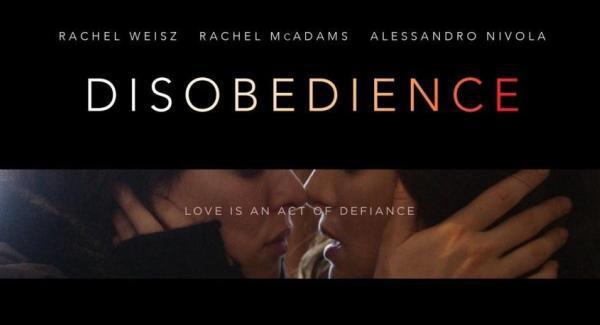Susan Granger’s review of “Disobedience” (Bleecker Street)
Chilean director Sebastian Lelio, who won this year’s Foreign Language Oscar for the transgender drama “A Fantastic Woman,” has adapted Naomi Alderman’s novel as his first English-language film, co-writing with playwright Rebecca Lenkiewicz (“Ida”).
Set in Hendon, the north London suburb where the Alderman, a former Orthodox Jew, grew up, it begins as elderly, revered Rav Krushka (Anton Lesser) is giving what will be his last sermon – on the nature of free will, a divine gift bestowed only on humans.
After he dies, his long-estranged daughter, New York avant-garde photographer Ronit (Rachel Weisz) rushes home. But that’s an insular, devoutly religious patriarchy, where she is treated with outwardly courteous but obvious contempt. She openly smokes, doesn’t cover her head, and rails against “institutional obligation.”
Greeting her at the door where they’re sitting Shiva is Rabbi Dovid (Alessandro Nivola), her father’s disciple/surrogate son, her childhood friend, soon to be chosen as her father’s successor. To her astonishment, Ronit discovers that he’s now married to her closest friend – and furtive teenage lover – Esti (Rachel McAdams).
When Ronnit inquires: “Do you guys have sex every Friday?” Esti demurely nods, “It’s expected.” To which Ronnit, an avid feminist, murmurs, “Medieval.”
The women’s lesbian relationship is immediately rekindled, culminating in an afternoon of anguish and erotic ecstasy. Predictably, their ‘forbidden’ secret is soon discovered. The two Rachels deliver sympathetically realistic performances, while Alessandro Nivola’s restrained anguish is palpable.
While Sebastian Lelio reveals the austere manners and mores of the close-knit, cloistered community, his heavy-handed, one-sided, melodramatic depiction of sadly repressed, oppressed Hasidic women in frumpy, dark clothes follows Natalie Portman’s “New York, I Love You” and Renee Zellweger’s “A Price Above Rubies,” among others.
In recent years, I have come to know reverently Orthodox women who exult in the joy and fullness of their traditional lives, presiding over their weekly Shabbat dinners.
On the Granger Movie Gauge of 1 to 10, “Disobedience” is a sensitive, yet simplistic 6, revealing an ideological, fundamentalist dilemma to a secular audience.

